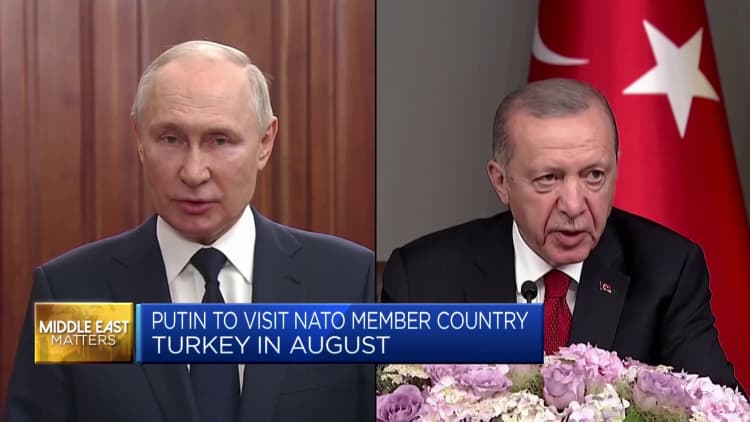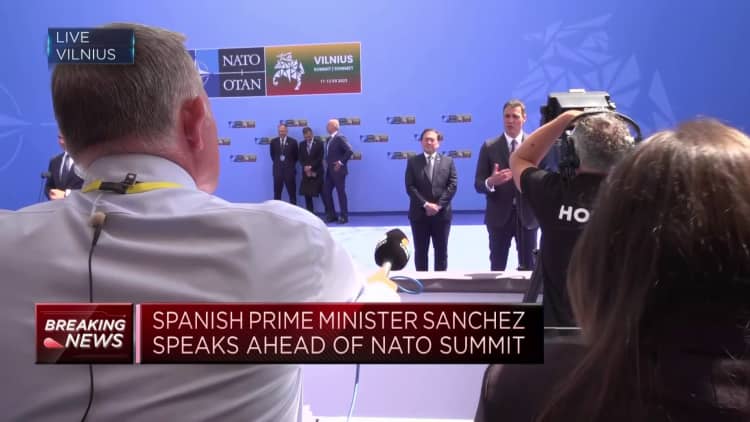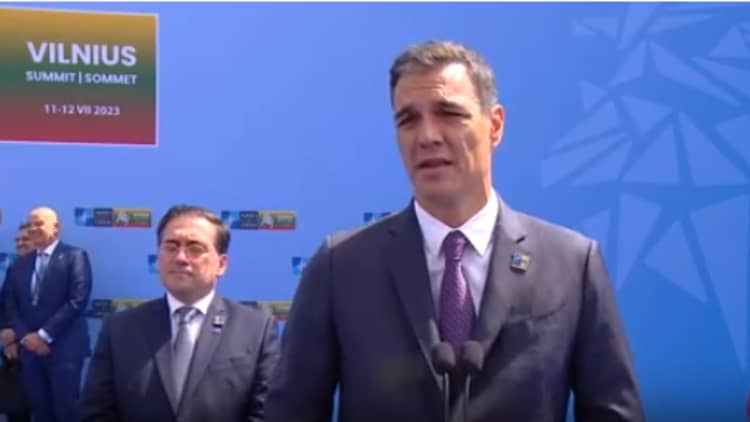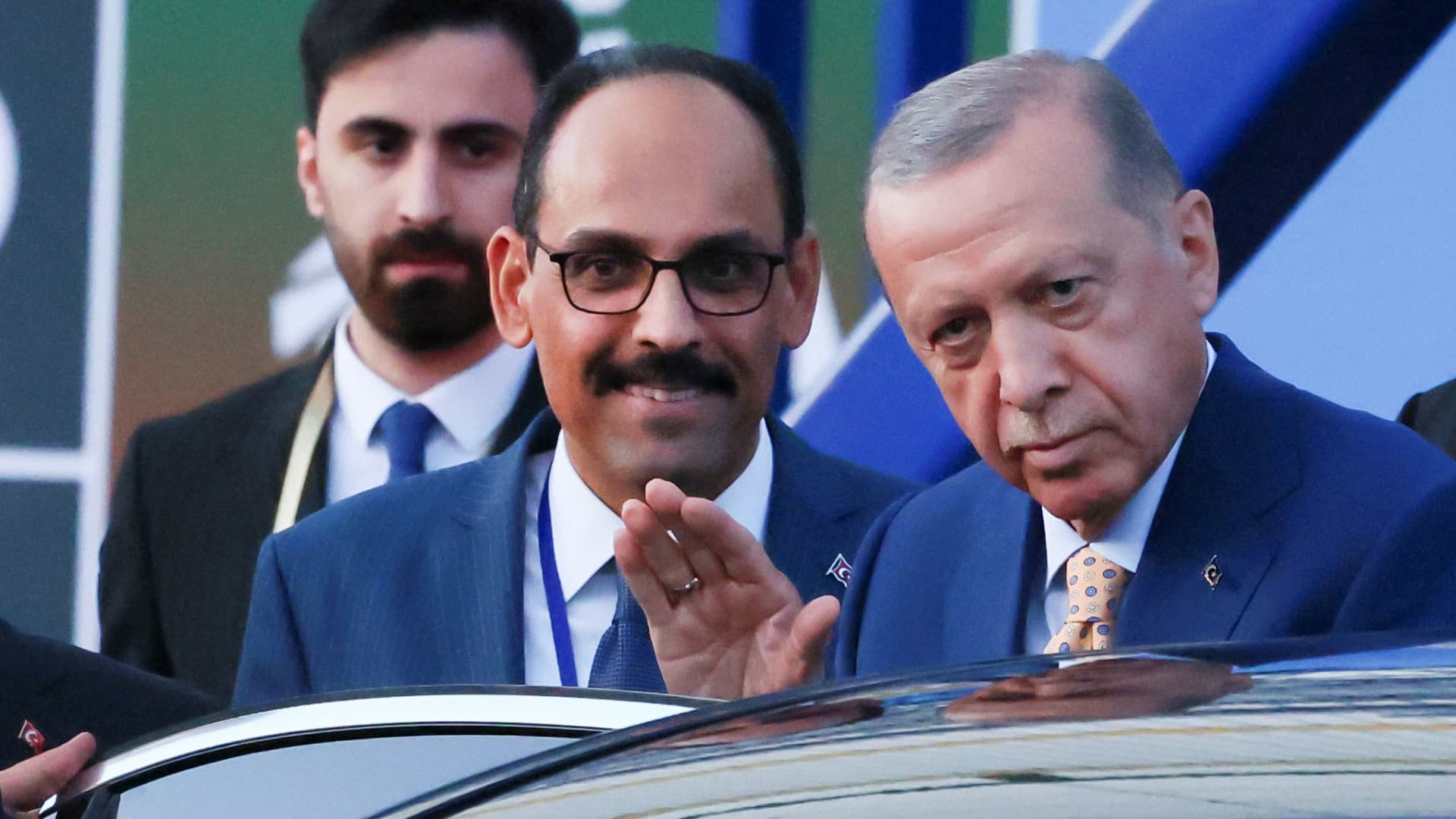Turkey’s President Recep Tayyip Erdogan.
Kenzo Tribouillard | Afp | Getty Images
President Recep Tayyip Erdoğan renewed his country’s bid to become a member of the European Union, amid wrangling over Sweden’s NATO entry, but political experts aren’t completely convinced of the Turkish leader’s aims.
Erdogan surprised many on Monday by linking Sweden’s bid to join NATO with his country’s accession to the EU. He said European nations should “open the way” for Turkey to join the political bloc in exchange for Ankara’s approval of Sweden to be a member of the military alliance. But these are two completely different processes for two very separate institutions.
“I was quite surprised he linked this,” Maria Demertzis, senior fellow at the Brussels-based think tank Bruegel, told CNBC Tuesday. “You are throwing a fish net to see what you can get,” she said of Erdogan’s move.
Turkey and the EU have had a challenging relationship over the years. Ankara applied to be part of the EU back in 1987 but, after several bumps in the road, talks to join the political group froze in 2018. The EU deemed that Turkey was putting forward a lot of political reforms that actually moved it “further away” from the bloc.
One of the policy changes that infuriated the EU was a 2017 referendum that gave Erdogan more executive powers.
“He needs money,” an EU official, who did not want to be named due to the sensitive nature of the topic told CNBC Tuesday, regarding why Erdogan brought up this issue again now. “All this new friendship with the West. He has not changed. He wants something,” the same official added.
A spokesperson for the Turkish representation office in Brussels was not immediately available for comment when contacted by CNBC.

In 2016, the EU agreed to disburse 6 billion euros ($6.5 billion) in two tranches to Ankara in order for it to deal with a high influx of refugees. The agreement came after the EU saw an unprecedented level of refugees at its borders.
“The EU has a huge problem if Erdogan doesn’t cooperate,” Demertzis said. “The EU depends on Turkey to deal with migrants.”
Refugee arrivals into the EU in 2023 are aren’t currently near those levels seen in 2015, at the height of the region’s migration crisis. However, with around 4 million refugees currently based in Turkey, the lawmakers in Ankara still have a lot of negotiating power when it comes to Brussels.
“It is more than [money],” Özgür Ünlühisarcıklı, director of the Ankara office for the think tank The German Marshall Fund, told CNBC Tuesday.
“[Erdogan] expects a more special relationship,” he added, mentioning a potential visit of the French president later this year to Turkey. Erdogan “needs to see more visits of this sort,” Ünlühisarcıklı said.
What else could the EU give?
The European Commission, the executive arm of the EU and the institution that monitors countries’ accession process to the bloc, said Monday that it is up to Ankara to do the work needed to join the political and economic group.
“The European Union has a very structured process of enlargement and with a very, very clear set of steps that need to be taken by all candidate countries and even for those who want to become candidate countries,” a spokesperson for commission told reporters Monday.

“The accession process for each candidate country is based on the merits of each country,” the same spokesperson added.
But, according to Ünlühisarcıklı, Erdogan might not even want membership of the EU. “It goes too far” as this would ensure certain unwanted measures are introduced in Turkey, he said.
He mentioned that customs union modernization and visa liberalization would be more appealing to Turkey. The former would support commerce with European countries and the latter would allow Turkish citizens to travel more easily in the EU.
However, it will be difficult for the EU to give Turkey significant benefits. Countries such as Greece and Cyprus have historic disputes with Ankara, for example. It is also hard for some EU nations, mainly in the wake of the war in Ukraine, to trust Erdogan given his links to the Kremlin.


